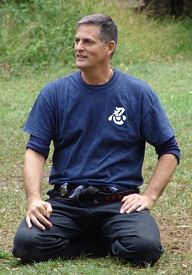 The interviews conducted here at Warrior Fitness will highlight people who have significantly influenced my thinking and training on fitness, who are leaders in their particular fields of expertise, and whom I admire. Jack Hoban happens to fit all three. Through his unwavering commitment to martial arts and fitness, Jack has inspired me to keep going over the past 20 years down the dual path of martial arts and fitness.
The interviews conducted here at Warrior Fitness will highlight people who have significantly influenced my thinking and training on fitness, who are leaders in their particular fields of expertise, and whom I admire. Jack Hoban happens to fit all three. Through his unwavering commitment to martial arts and fitness, Jack has inspired me to keep going over the past 20 years down the dual path of martial arts and fitness.
Jack Hoban is a former active duty U.S. Marine Corps Captain and long time practitioner of martial arts. He is Shidoshi Senior Instructor in the Bujinkan Budo Taijutsu and Togakure Ryu Ninjutsu systems under Grand Master Masaaki Hatsumi in Japan and has authored three books on warriorship. Mr. Hoban also holds an MBA and is an executive in the healthcare industry. Jack’s full biography, and further information, can be found on his website here.
1. Can you please describe your current philosophy on physical fitness?
I have been serious about physical fitness for most of my life, first as an athlete in grammar school, high school and college, and then as a Marine, and martial artist. That hasn’t changed, just become more refined and age-appropriate as the years have gone by. Humans are physical beings and have been so for millions of years; I think we should acknowledge and honor that fact by maintaining a high level of physicality in our lives. That’s my philosophy. Until fairly recently, being physically fit, for most of us, was just a part of being human—and staying alive through hunting and gathering, farming, work, or other physical endeavors. That has changed, and there is a greater risk of falling into a sedentary lifestyle today. But our basic nature as physical animals has not changed. We have to be careful not to stray too far from our nature, or certainly unhappiness and ill health may result.
2. How has your outlook changed over the years?
It really hasn’t changed. It has just become more refined. I have tried some of the new fitness technologies—for example I run barefoot now using the new Vibram footwear. I also think I use cross-training more effectively than in the past. But I pretty much do the kinds of things I have always done. I do have to worry more about “overdoing it,” because injuries take longer to heal.
3. Do you have a daily fitness regimen that you follow?
Yes and no. I have a range of things that I do, but it changes according to my schedule, the season, the weather and how I am feeling.
4. Can you briefly tell us what it consists of?
Again, it is not a daily thing in that I don’t do the same thing every day. But over the course of a week I typically fit in a few runs (45 minutes to an hour), I lift weights, I do a lot of core training, and I do various calisthenics. In the winter I use the gym for the rowing machine, treadmill and elliptical. In the summer I swim in the ocean almost every day. I practice martial arts daily by myself, and have a class between 2 and 5 times a week.
5. How do you think fitness and budo (martial arts) are related?
Inseparably, although martial artists might take care to explore a regimen that is complimentary to martial arts—one that increases strength and endurance, but also promotes flexibility and relaxation.
6. How has your being in excellent physical condition enhanced your martial arts training?
Simple, it helps me to “keep going” longer and more consistently without being tired or sick. And by the way, real fights are very physical—tiring and punishing.
7. How does your being in excellent physical condition help your work with the Marine Corps Martial Arts Program (MCMAP)?
When I first meet a new class of students, the unspoken question is “Is he one of us? Can he do what we do? If he can’t, why should we do what he does?” That’s just the nature of young, competitive men. Because I can pretty much keep up with them “for an old guy,” I gain a certain measure of respect. That way, they are open to the other physical and ethical lessons I am there to share.
8. Has the Marines Combat Conditioning program influenced your personal exercise program, and if so, how?
Yes, in at least two ways. It has made me more aware of the value of cross training, and two, it has made me more creative in using training aides of opportunity. By that I mean, you can design your own training regimens and make your own training apparatuses just by using your brain and common items and structures. You don’t need fancy equipment; an old tire works just fine as an exercise apparatus.
9. The last, but most important question, how do you keep going?
I enjoy it! Find a method of physical exercise that you enjoy and pursue that. Find other people who like it as well, and do it together. That will help too.
Thanks Jack!





5 Comments
Josh @ Fretterverse
February 24, 2010I especially love the answer to question #8. That’s pretty much one of the core philosophies of Warrior Fitness!
David C. Furukawa
February 25, 2010Hi Guys,
A nice interview with great questions and dynamic answers.Thanks for sharing this with all of us.Take care!
Dave
Craig Gray
February 26, 2010Great article! I couldn’t agree more with Jack. I too have been active my entire life with martial arts, sports, etc. As I continue to get older learning to train smarter, not harder is important. I agree trying to keep things in balance and fun so we can continue to “keep going” is the key.
All the best,
Craig Gray
http://www.roninuniverse.ning.com
Tony N
March 2, 2010Great questions and answers! For me this almost hidden sentence was key “I think we should acknowledge and honor that fact by maintaining a high level of physicality in our lives”.
When I was in my late teens and early twenties I was quite a fitness fanatic, but as I got older and matured somewhat I found that I cared less about being anything but just above mediocre. Why? Firstly because I over did it, got sick and had to start from scratch. But also I really lost the desire to ‘push’ myself anymore, partly out of fear of overdoing it again, and partly because I felt it was a selfish endeavour. I studied Sports Science as a Bachelors and was surrounded by arrogant, selfish individuals who only wanted to prove themselves with physical feats. This really took a toll on my own motivation, occassionally I might get back into it but eventually I just couldn’t justify the time and effort on myself. I was not unfit, I just wasn’t where I could be.
A few years ago I started to get educated about the Living Values concepts that Jack teaches. During this time something interesting occured that I would like to share. I realized that although I was doing enough fitness to keep myself from being a health burden on anyone, I certainly wasn’t anywhere near fit enough to protect others easily. I started to switch from thinking about how my effort would benefit me, to how my effort could potentially benefit others. Suddenly those fears of ego-centric motivation are balanced out by a more generic motivation of self and others. This didn’t happen over night, but the more I think about it, the more it ‘unblocks’ me from moving forwards with fitness goals.
Mark Roemke
July 4, 2012Awesome, i have been inspired buy watching Jack live what he speaks about. At some of the seminars i have attended with him he always takes off at lunch for a run in the middle of training all day. I really like that he leads by doing, not by just talking. It inspired me to keep up the same philosophy and way of being a teacher with my students. Funny how some of the most important lessons in life are sometimes just learning by watching what happens when the teacher is not up on stage but just living.
Leave A Response